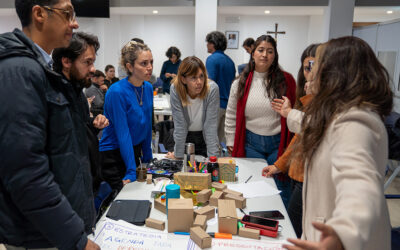290 leaders of the Family of Hope Association (‘Familia da Esperanca’) visited the International Centre of the Focolare Movement on 28 May to celebrate and to thank Chiara for the approval that they had just received from the Pontifical Council for the Laity. The members of the Association – of Brazilian origin but now spread all over the world – are involved in many social areas, the main one being their work with young drug addicts. At the Centre they met with Eli Folonari, who was Chiara’s personal secretary, and Maria Voce and Giancarlo Faletti, President and Co-President respectively of the Focolare Movement, for a moment of reflection and sharing on the theme of ‘God who is Love’.
‘What is it that links us together?’ Maria Voce asked. ‘The main link is the life of the Word, which is translated into concrete actions, day by day, and takes us along a path of sanctity, no matter where our starting point was, but is something to be lived in the present moment,’ she went on to explain. Giancarlo Faletti continued: ‘The Word of God is not like other words. Other words produce a plant that lives for a short while and then dies. Instead, the Word of God produces a big plant that lasts forever. I believe that you are witnesses to this vitality.’
The beginnings of the association go back to 1983, to a corner of a street in Guaratingueta, in the inland part of the State of San Paolo. Nelson Giovanelli got to know a group of young drug addicts in his neighbourhood in an attempt to live out the words of the Apostle Paul when he said: ‘ I’ve made myself weak with the weak …’ One of them called Eleuterio, was the first to become involved and to ask help in overcoming his drug dependency. Many others followed. Somebody who helped the work of Nelson Giovanelli right from the start was a German Franciscan friar called Frei Hans Stapel, who knew the spirituality of unity of Chiara Lubich and the spirituality of poverty of St Francis of Assisi.
A community was born and grew with these young people based on an evangelical lifestyle. The association has spread throughout the world today. There are 68 Fazendas (40 in Brazil alone) working with around 3,000 young people. It is present in nine ther countries in the world: Germany, Russia, the Philippines, Mozambique, Mexico, Guatemala, Paraguay, Uruguay, Columbia and Argentina.
 The ‘Fazendas da Esperanca’ became better known after Pope Benedict XVI visited the community of Pedrinhas on the occasion of his apostolic visit to Brazil in 2007. The meeting of the Holy Father with the young people of the Fazenda was one of the most moving moments of that trip. The Pope launched a strong appeal against those that sow death through drugs: ‘They will have to answer God for what they have done.’ And to the young people who have returned to life because of the Fazenda da Esperanca he gave a mission for the future: ‘You must be ambassadors of hope!’
The ‘Fazendas da Esperanca’ became better known after Pope Benedict XVI visited the community of Pedrinhas on the occasion of his apostolic visit to Brazil in 2007. The meeting of the Holy Father with the young people of the Fazenda was one of the most moving moments of that trip. The Pope launched a strong appeal against those that sow death through drugs: ‘They will have to answer God for what they have done.’ And to the young people who have returned to life because of the Fazenda da Esperanca he gave a mission for the future: ‘You must be ambassadors of hope!’
The ‘Family of Hope’ – the official name of the Association of the faithful which has just.jpg) been approved – is not a congregation or a secular institute, and cannot be defined as a spiritual movement like the Charismatics or the Focolare – it is a new community of lay people. It is something new in the Church. Speaking of this Maria Voce said: ‘The Church doesn’t approve a Rule as such. It approves a reality, a life that already exists. This recognition is a sign of joy. With this joy in our hearts – yours, ours and the whole Church – I think we can truly thank God.’
been approved – is not a congregation or a secular institute, and cannot be defined as a spiritual movement like the Charismatics or the Focolare – it is a new community of lay people. It is something new in the Church. Speaking of this Maria Voce said: ‘The Church doesn’t approve a Rule as such. It approves a reality, a life that already exists. This recognition is a sign of joy. With this joy in our hearts – yours, ours and the whole Church – I think we can truly thank God.’




0 Comments